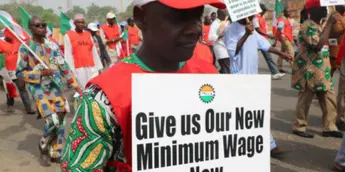By Aaior K. Comfort
ABUJA — Tensions are rising among federal public workers following the Federal Government’s selective payment of the new N70,000 minimum wage. Many workers, especially in federal universities and certain Ministries, Departments, and Agencies (MDAs), have expressed frustration over the lack of salary adjustments, accusing the government of insensitivity.
Several workers decried the situation, attributing their economic hardships and hunger to the government’s policies. Affected employees described the delay as a failure on the government’s part to alleviate the economic burdens caused by the removal of fuel subsidies and other price increases.
One university worker, who spoke on condition of anonymity, said, “The government has removed the fuel subsidy and increased the cost of living, but they haven’t implemented the minimum wage that was signed into law since July. It’s pure discrimination, and many of us are now starving.”
The Federal Government signed the new minimum wage law on July 18, 2024, after lengthy negotiations with labor unions, including the Nigeria Labour Congress (NLC) and Trade Union Congress (TUC). However, reports indicate that only some workers in core civil service departments received an additional N40,000 in their September salaries, which is far below the promised N70,000.
While sources in the Accountant-General’s Office claim the new minimum wage was factored into September salaries, the Budget Office confirmed that only N40,000 was paid across the board as a temporary measure, pending the release of an official wage template.
A Federal Government memo explained that the N40,000 flat payment was issued to all civil servants as an interim solution. The official minimum wage implementation, including arrears for August, is expected to begin in October.
Labour Reacts
Labor leaders have criticized the selective payment, with many describing the situation as a breach of trust. Benjamin Anthony, President of the Amalgamated Union of Public Corporation, Civil Service Technical, and Recreational Services Employees (AUPCTRE), voiced his discontent. “An insignificant number of workers received an increase, but most did not. To me, that means nobody has been paid the new minimum wage,” Anthony said.
Leaders from other unions, including the National Association of Academic Technologists (NAAT) and Senior Staff Association of Nigerian Universities (SSANU), echoed these concerns. They noted the financial strain on workers, particularly those in universities, many of whom face long commutes and struggle to meet basic needs.
NAAT President, Ibeji Nwokoma, said, “Government has fallen short of expectations. People are suffering, parking their cars, unable to take their children to school, and families can no longer cope.”
SSANU President Mohammed Ibrahim emphasized the impact on university staff morale and productivity, urging the government to resolve the delay and begin full payment of the new minimum wage.
As the situation remains unresolved, workers and unions continue to demand prompt action to alleviate the economic pressures exacerbated by the rising cost of living.

